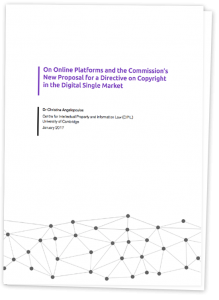Dr Christina Angelopoulos, associate research fellow at the Information Law & Policy Centre and lecturer at the University of Cambridge, has authored a study entitled ‘On Online Platforms and the Commission’s New Proposal for a Directive on Copyright in the Digital Single Market’.
The study, commissioned by MEP Julia Reda, evaluates the provisions of the European Commission’s Proposal of 14 September 2016 for a Directive on Copyright in the Digital Single Market that are relevant to the issue of intermediary liability.
The study concludes that key elements of these provisions are incompatible with existing EU directives, as well as with the Charter of Fundamental Rights of the EU.
In particular, the study suggests that the Proposal misinterprets EU copyright and related rights law by implying that intermediaries that allow users to host content in a public manner are themselves performing an act of communication to the public. The study argues that acts of facilitation of third party copyright infringement are instead the rightful domain, not of primary, but of accessory liability, an area of copyright and related rights law that has not yet been harmonised at the EU level.
The Proposal also misrepresents Article 14 of the E-Commerce Directive, by suggesting that these providers will lose the protection of the hosting safe harbour of Article 14 of the E-Commerce Directive where they promote or optimise the presentation of uploaded works or subject matter, irrespective of the nature of the means used therefor. This substantially misrepresents the relevant case law of the CJEU, as well as Recital 42 of the E-Commerce Directive. Both of these indicate the need for the relevant hosts to have knowledge and control over specific unlawful data before immunity can be denied.
Finally, the reference in the Proposal to ‘effective content recognition technologies’ also raises questions. Given that such technologies require the monitoring of the behaviour of all of a providers’ end-users, the introduction of an obligation for providers to adopt such technology would go against the prohibition on general monitoring obligations introduced by Article 15(1) of the E-Commerce Directive. As the case law of the CJEU has made clear, it would also violate the principle of a ‘fair balance’ between competing fundamental rights, recognised by that Court as essential in this area, by imposing a disproportionate burden on intermediaries’ freedom to conduct their business (Article 16 of the Charter), as well as end-users’ right to the protection of their personal data (Article 9 of the Charter) and to their freedom of expression (Article 11 of the Charter).
Having reached these conclusions, the study provides a series of recommendations for potential ways forward. The optimal solution it recommends would be the deletion of the relevant provisions. Alternatively, the most problematic aspects could be removed. If these possibilities are deemed politically undesirable, more constructive options can be found in amendments for the introduction either of a notice-and-action system or a duty of care for intermediaries to remove notified content where certain requirements are met.
Finally, the study recommends, as the most appropriate approach, the replacement of the current text with provisions for the harmonisation of accessory liability for the infringement of copyright or related rights. Complementing this option, the study also recommends the introduction of an Alternative Compensation System (ACS) for rightholders covering non-commercial direct copyright and related rights infringement committed online by end-users.
The full paper is available online here.
